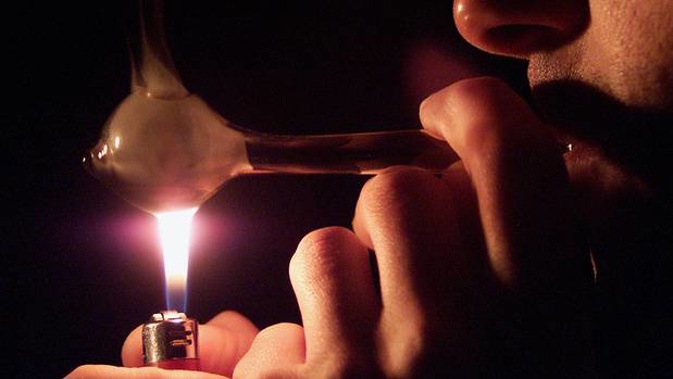
A leading baby specialist says as many as one infant a week born at Starship children's hospital has been exposed in the womb to methamphetamine.
Dr Simon Rowley suspects the frequency of P-exposed babies is "probably a little bit more" than the one every fortnight to one each week average he estimated in 2016.
"We see babies whose mothers have admitted being on P occasionally," said Rowley, who has worked at Starship since 1984.
"We see others where we're pretty sure they have been, on the way the baby's behaved and some of the other demographics of the mother."
An Official Information Act request revealed 10 babies were born at Starship last year "with withdrawal symptoms from maternal use of drugs of addiction".
But Rowley, the hospital's newborn services consultant paediatrician, said many women did not disclose they were on methamphetamine during their pregnancy.
Doctors were likely to know if new mothers were on methadone for drug dependence therapy because they would be on a programme.
Symptoms of babies exposed to P in the womb included being "really disorganised in their behaviours for the first few days and maybe weeks".
Studies showed these babies did not feed well, and had jerky movements.
"They don't have nice settled routines, that makes them hard to look after,"
Rowley said.
P use also risked babies miscarrying or having physical abnormalities.
Rowley said newborns were seen with withdrawal symptoms.
"If the mother's been having a drug, therefore the baby's been having it."
/arc-anglerfish-syd-prod-nzme.s3.amazonaws.com/public/VPFZNQEFKZA4BAI5REMRVF44NA.jpg)
Paediatrician Dr Simon Rowley has seen an increase in P-exposed newborns over the past two years. Photo / Dean Purcell
If that supply had been throughout the pregnancy, "then all of a sudden they're delivered [and] that supply finishes... they may get withdrawal".
The babies could be "jittery and tremulous, they may want to suck but they can't and so their feeding is poor, they may have mild fevers".
"They can have quite an irritable cry. They're pretty miserable."
Those with withdrawals could require small amounts of morphine at increasingly reduced dosages until the symptoms subsided, which could take up to three weeks.
Mothers whose newborn babies had been exposed to P were as young as 17 or18, Rowley said.
Asked if there were any common factors amongst the women, he said: "I think drug-taking generally is associated with other demographics, which include lifestyle issues.
"For a lot of these mothers, they want the best for their babies since they start to realise they're pregnant. [But] sometimes they can't stop [using drugs] because they're living in a social milieu where it's just impossible.
"Other times they can't stop... because they are addicted and they need to have the drugs. They may have the will but not the wherewithal."
He said there needed to be a much greater awareness in young people about the dangers for the baby of taking drugs while pregnant.
Dr Trecia Wouldes is director of the Ideal (Infant Development Environment and Lifestyle) study, tracked the neuro development of 107 children in Auckland whose mothers had used P during pregnancy.
The study of the women, aged from around 17 to late 30s, has been going for 12 years.
Wouldes, an associate professor in the department of psychological medicine at Auckland University, said they were analysing data from the children at six-and-a-half years.
/arc-anglerfish-syd-prod-nzme.s3.amazonaws.com/public/AAFUCNBBHBBTXGTOLVNGQNIGE4.jpg)
Dr Trecia Wouldes is researching the health of children exposed to P. Photo / file.
They were starting to find "differences in memory, particularly general memory and delayed memory" suggesting "they're having problems with attention".
"I think what we're going to see is that they have problems with those things... we call executive function.
"They're the things that you need when you go to school. Skills like attention, and being able to sit quietly and listen.
"[Being] able to transition from one task to another task."
Wouldes said they had found differences at pre-school age in the executive function of children in the study compared to others who had not been exposed to P in the womb.
That also related to the "challenging environment" a number lived in, and mental health of the mothers.
"We found that these women have a high rate of mental illness – depression, psychosis. So it's environment and drug exposure – it's not just a simple, exposure to methamphetamine causes this."
Heavy use of methamphetamine can cause psychosis, she said.
Wouldes said she had received letters from school principals and spoken to police social workers concerned about the effects on children of P, "particularly in primary school".
"I had a letter from a principal just a couple of weeks ago, who said in his 10 years of being a principal he had never had so many behavioural problems, and he knew that a lot of the parents of these children were probably using methamphetamine."
The Ideal study was designing an intervention strategy.
It would identify women using P during pregnancy "and use our data to target those things that we think we can do to help the kids that have been exposed".
"The best thing is get the mother off the drugs, 'cause quite often they use all the way through pregnancy.
"Get them mental health treatment.
"We need to treat those two things together, because quite often women start using drugs because of their mental illness."
In May it was revealed eight pregnant mothers had been referred to a Salvation Army run P-treatment course in Kaitaia in less than three months.
The Salvation Army was investigating extra ways to support pregnant women using methamphetamine, including around parenting while managing a recovery from addiction.
Salvation Army national director of addiction services Lieutenant Colonel Lynette Hutson said the issue had arisen as "a direct result of the whole of the methamphetamine environment that we've got at the moment".
P was "pervasive, all through the community and easily accessed".
Nearly as many people were seeking help from Salvation Army services for methamphetamine use as problems with alcohol, Hutson said.
The age range of those affected by P had become "younger and younger" over the years. But "every age cohort is using methamphetamine now". They have helped people in their 70s.
It was also throughout the country.
While they were aware P "has flooded" communities in Northland, "equally now, it's right down through to our services in Dunedin".
Hutson said the methamphetamine prevalence had to be seen primarily as a health issue.
The "slip across the line into addiction" for people using it recreationally could be "fast with methamphetamine, and unpredictable, and can happen to anybody – the best of families, the most deprived background".
Faster treatment options were needed.
"You just can't leave it, it impacts so many people in the community."
Take your Radio, Podcasts and Music with you









